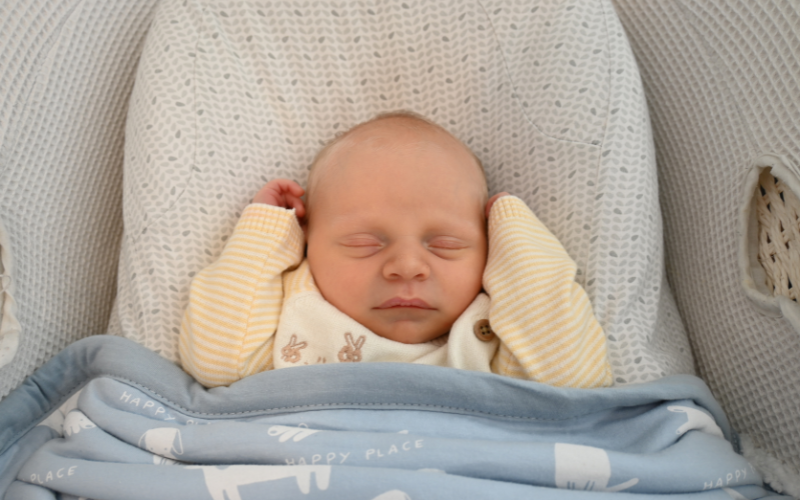
The AERIAL study, in partnership with The ORIGINS Project (Joondalup Health Campus), endeavours to understand if exposures during pregnancy and early life can affect the cells lining the airways (epithelial cells) in newborns, and whether this is associated with the development of wheeze, allergy and asthma later in childhood.
The Origins Project is a longitudinal cohort study which aims to examine how early life factors can influence the health and development of the next generation of children from the first moments of life.
This month, the AERIAL study - which commenced in August 2020 - celebrated a significant milestone with the recruitment of the final participants, baby Isaac and his mum Leah - who were also the last family recruited into the ORIGINS Project.
The AERIAL study includes 14 siblings, two sets of twins, 324 placenta samples and 462 newborn nasal samples.
As part of the study, the families of these babies are asked to use a mobile app - AERIAL TempTracker - to record their baby’s temperatures and symptoms associated with viral infections such as a runny nose or cough in the first year of their baby’s life.
If a fever and symptoms are detected, the app will prompt the AERIAL team to contact the family for a nose/throat swab. These swabs are then sent to Western Diagnostics Pathology for testing for eight different respiratory viruses and parents are informed of the results.
For the study, this viral information is used to establish if there are any associations to the gene signature patterns and profiles identified in the baby’s nose epithelial cells.
Lead researcher on the AERIAL study Dr Liz Starcevich, who works with the Wal-yan Respiratory Research Centre – a powerhouse partnership between The Kids Research Institute Australia, Perth Children’s Hospital Foundation and Perth Children’s Hospital – said this study will contribute to research that could change the way we identify and treat early-life airway conditions.
“Research has shown that in children with asthma, the epithelial cells are different - they do not form a tight strong barrier and respond differently to viral infections,” Dr Starcevich said.
“Viral infections in the first few months of life play an important part in the development of early-life lung conditions, such as wheeze. The team have also identified that genetic factors can similarly influence this barrier’s function.
The AERIAL study is looking to find out more about the impact of pregnancy and early life exposures on the newborn nose epithelial and how this contributes to the development of childhood lung disease.
“The aim is to improve the way we identify and treat conditions such as asthma, wheeze and allergy.”
Dr Starcevich said this important research is only made possible thanks to the families who take part.
“The AERIAL team is thrilled to have recruited our final participants to this study, and I would like to thank all the families involved for their contribution to this important research.
By taking part in AERIAL, the whole community benefits, bringing new hope for kids with respiratory conditions.
The AERIAL Study aims to answer the following questions:
- Are we born with certain airway epithelial gene signature patterns?
- Can exposures during pregnancy leave a fingerprint on the genetic material of the airway epithelial cells?
- How does the type and number of viral infections in first few months of life relate to the gene pattern and profiles identified?
- Are these gene signature patterns associated with the development of wheeze, allergy and asthma later in childhood?
